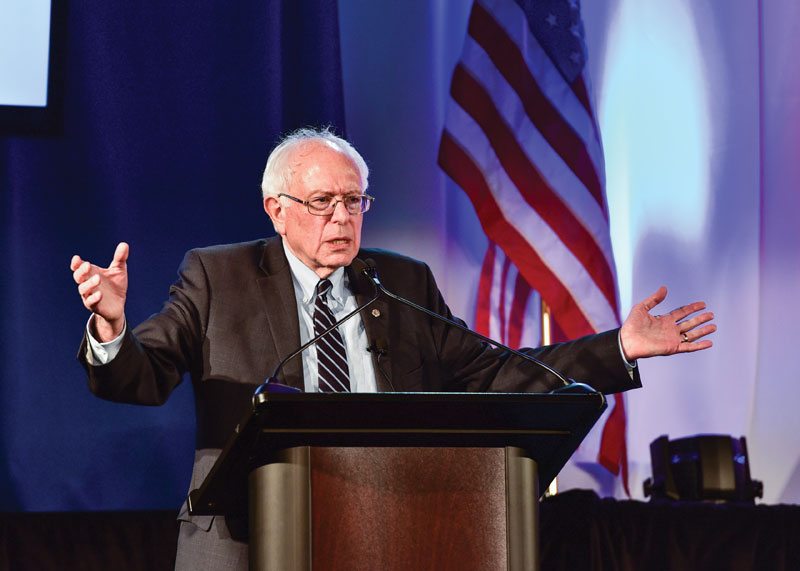U.S. Lawmakers Call Out Marathon Pharmaceuticals on Pricing
 U.S. Representative Elijah Cummings and Senator Bernie Sanders recently asked Marathon to justify its $54,000 a year (after discounts) drugs, including Emflaza, a treatment for Duchenne muscular dystrophy, according to the Washington Post. The politicians want Marathon to disclose development costs, show how the price was set, and what they expect to generate in revenue. In a letter, Sanders and Cummings wrote, “Marathon acquired the rights to historical clinical trial data from the 1990s and completed additional analyses to gain approval from the [FDA] to sell the drug in the U.S.” U.S. patients are importing a comparable Canadian drug for $1,000 a year. Lawmakers say Marathon should not have market exclusivity for a drug that has been widely available for decades.
U.S. Representative Elijah Cummings and Senator Bernie Sanders recently asked Marathon to justify its $54,000 a year (after discounts) drugs, including Emflaza, a treatment for Duchenne muscular dystrophy, according to the Washington Post. The politicians want Marathon to disclose development costs, show how the price was set, and what they expect to generate in revenue. In a letter, Sanders and Cummings wrote, “Marathon acquired the rights to historical clinical trial data from the 1990s and completed additional analyses to gain approval from the [FDA] to sell the drug in the U.S.” U.S. patients are importing a comparable Canadian drug for $1,000 a year. Lawmakers say Marathon should not have market exclusivity for a drug that has been widely available for decades.
As a result, Marathon hit pause on the Emflaza launch, planning to move forward after speaking to caregivers and discussing how pricing and reimbursement decisions affects treatment. The Pharmaceutical Research and Manufacturers of America is planning to launch an advertising campaign to address overpricing practices.
Reltio Cloud to Focus on IT Data Management

Reltio Cloud 2017.1 is currently in preview and is expected to provide data-driven applications with reliable master data, relevant big data insights, and intelligent recommended actions to major fortune 500 companies. It focuses on IT data management to deliver real-time operational execution and analytical insight to frontline business users. “Digital transformation and personalized customer experience is driving rapid internal IT change,” says Eric Newmark, Program Vice President of SaaS, Industry Cloud, and Digital Business Models, at IDC Research. “IT buyers are shifting steadily toward cloud-first strategies.” Reltio Cloud says hundreds of terabytes of enterprise data are under management, 99.95% operational SLAs, and billions of multi-domain entities and relationships are managed in polygot storage.
Academics Demand Less Expensive Cancer Drug Development
European and U.S. academic researchers want to put a stop to charging $100,000 a year for cancer drugs and hope to do this with a new model of low-cost drug development. This model calls for academic groups to work with smaller companies committed to price caps, generic drug companies, or non-profit organizations rather than large brand-name drugmakers.
Researchers want to capitalize on scientific advances and ask academic centers to focus on securing drug price caps as part of their negotiations with commercial partners. Paul Workman, one of the proposal’s authors, says, “Charging $100,000 is unsustainable. We need to think about getting prices down towards a half or a third of that, ideally even less.”
28,000 Job Losses are Linked to Medical Device Tax

Industry group, AdvaMed, wants the ACA repealed, and pinned its 2.3% medical device tax as the cause of a 7.2% decline in medical tech jobs, according to The Hill. The Commerce Department records medical technology jobs dropping by 28,000 between 2012 and 2015. Scott Whitaker, President and CEO of AdvaMed, said in a statement, “These numbers reveal just how devastating an impact the device tax had on our industry and underscores the urgent need for permanent repeal.”
Congressional Research says the tax fell on consumers, but AdvaMed claims their reasoning is flawed, since “medical devices and diagnostics are not generally purchased by individual patients, but institutions such as hospitals, clinical labs, and physician practices. In a highly competitive market such as medical devices, such purchasers have the ability to refuse to accept price increases.”
Congressional members noted, “Then these medical device firms are in the same circumstance as firms in a competitive market and must pass forward the tax in higher prices (which is a cost, just as wages are a cost) to stay in business.” AdvaMed and others in the industry insist that the job loss is too closely correlated with the timeline of the medical device tax.
Indigenus Renames as The Bloc Partners
The agencies previously named Indigenus announced a new alliance that reflects a commitment to grow as a unified entity. The alliance took the name of a founding partner, becoming The Bloc Partners. André Darmon, Co-chairman of The Bloc Partners and president of French partner agency, said in a statement, “In addition to our deep healthcare roots, innovation, and capabilities, one of our key strengths is seamless collaboration and the personal working relationships we have with each other, which benefit our clients globally. That is why our name is about ‘partners’ and not about ‘global.’” Adds Masaki Yamagata, President of Japanese partner agency, “This collaboration overcomes every kind of barrier, from regulatory to language and customs. We have what it takes to drive the change a brand needs to succeed in a new country.”






